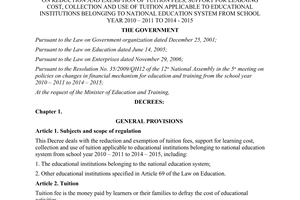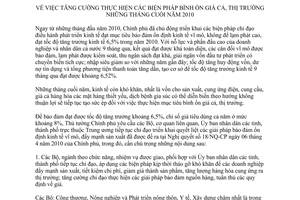Nội dung toàn văn Directive No. 1875/CT-TTg on intensifying the implementation of measures
|
THE PRIME MINISTER |
SOCIALIST
REPUBLIC OF VIET NAM |
|
No. 1875/2010/CT-TTg |
Hanoi, October 11, 2010 |
DIRECTIVE
ON INTENSIFYING THE IMPLEMENTATION OF MEASURES FOR STABILIZING PRICES AND MARKETS IN THE LAST MONTHS OF 2010
Since early 2010, the Government has taken the initiative in implementing measures to direct and administer economic development with the aims of ensuring stability of the macro economy, curbing inflation and achieving the economic growth rate of 6.5% in 2010. With untiring efforts of enterprises and people across the country, over the past nine months, relatively comprehensive results were recorded, macro balances guaranteed, inflation controlled, budget revenues increased, development investment capital positively disbursed; trade deficit reduced against previous years, the rates of capital mobilization, outstanding loans and total payment instruments incrementally increased, serving as bases for the economy to grow at around 6.52%.
In the remaining months of the year, our economy will still face difficulties, especially in capital for production, power supply, prices of essential goods, livestock epidemics, which may develop unfavorably, continuing to put pressures on the achievement of price and market stabilization objectives
In cider to achieve the annual growth rate of about 6.5% and price index of about 8%. the Prime Minister orders ministries, related agencies and People's Committees of provinces and centrally run cities (provincial-level People's Committees) to continue directing the implementation of drastic measures for ensuring stability of the macro economy and strongly boosting production already identified in the Government's Resolution No. 18/NQ-CP of April 4, 2010, paying special attention to the following:
1. Ministries and sectors shall, according to their assigned functions and tasks, coordinate with provincial-level People's Committees in further directing and applying measures to promptly resolve difficulties for enterprises to boost production, save expenses, reduce production costs and increase goods supplies on the market; and further urging the implementation of solutions to ensuring sources of goods supplies and observance of price regulations.
The Ministries of Industry and Trade; Agriculture and Rural Development; Health; and Construction shall complete and publish within the fourth quarter of 2010 master plans on the development of production and distribution systems of key products: petrol and oil, fertilizers, construction steel, cement, food and medicines, in line with the Government's policies staled in the Government Office's Notice No. 133/TB-VPCP of April 20, 2009.
2. The Ministry of Industry and Trade shall assume the prime responsibility for, and coordinate with ministries, branches and localities in:
- Studying and promulgating regulations on the responsibility of enterprises to ensure sufficient reserve goods for circulation when they trade in goods items for the purpose of price and market stabilization, especially enterprises with large market shares:
- Along with concentrating on directing the generation and supply of adequate electricity for production and life, paying attention to ensuring the supply of construction steel and foods and to the forecast of market trends and provision of information on essential commodities so as to help localities take the initiative in balancing supply and demand and implementing price valorization solutions:
- Scrutinizing production capacity and supply systems so as to work out specific plans to ensure supply demand balances with regard to essential goods and services for production and consumption through the end of 2010 and the first quarter of 2011; to meet needs for goods for the lunar new year festival in 2011: ensure adequate major supplies, fuels and materials for production as well as essential consumer goods; to take the initiative in drawing up appropriate plans to effectively combine domestic manufacture and import of essential goods to meet production and consumption needs:
- Flexibly organizing the supply of products to ensure uninterrupted circulation of goods across regions and areas nationwide; supplying goods on festive and new year occasions; offering specific incentives for enterprises to launch sales campaigns; studying and guiding the effective implementation of price valorization programs in localities;
- Directing functional agencies to intensify market control, combat trade fraud and inspect and strictly deal with violations of price regulations and illegal speculation to earn illicit profits from price hike; examining and controlling food hygiene and safety during processing and circulation, inspecting goods quality and measurement in association with checking prices against registered or posted ones;
- Working with commodity associations in order to come up with specific measures to remove difficulties and problems for export activities; expeditiously guiding the implementation of measures to control trade deficit under the Prime Minister's instructions in Official Letter No. 36/TTg-KTTH of September 22, 2010, the observance of regulations on use of home-made supplies and goods in state budget-funded projects and public procurement; and controlling trade deficit at around 20% of export turnover.
3. The Ministry of Finance shall assume the prime responsibility for, and coordinate with the Ministry of Industry and Trade, other ministries, agencies and provincial-level People's Committees in:
- In pursuance to current laws on taxation, control of super profit, combat of syndication to raise prices and illegal speculation, directing functional agencies in further controlling price constituents and fixing selling prices of essential goods and goods subject to price valorization under current regulations, particularly medicines, diary products, construction steel and materials and fuel gas, intensifying inspection and control to ensure that all organizations and individuals strictly observe and implement regulations on price registration and posting and sale at posted prices; strictly handling violations of pricing regulations to cam illicit profits;
- Keeping stable prices of electricity and coal sold to households generating and producing electricity, cement, fertilizers and paper in line with the Government's instruction in Resolution No. 18/NQ-CP of April 4, 2010; flexibly using the tools of taxes, charges and price valorization funds to keep stable petrol and oil prices;
Closely controlling pricing plans and price levels of national reserve goods; goods and services ordered or procured by the State with state budget funds or price and freight subsidies; and public-utility goods and services.
- Intensifying the management of budget collection and spending and use of state budget capital; supervising the observance of regulations on spending levels, regimes and norms by state budget-funded organizations and units. Taking specific measures to prevent budget revenue losses and tax fraud, practice thrift and combat wastefulness in budget spending. Ensuring sufficient funds for social security tasks. Suspending unnecessary and impractical spending.
4. The State Bank of Vietnam shall continue administering monetary policy in an active and flexible manner, ensuring the growth of credit and total payment instruments at reasonable levels in line with development objectives, meeting production requirements, incrementally reducing credit interest rates, administering foreign exchange rates in a flexible manner to ensure macro balances, encouraging export and increasing foreign currency reserves; reviewing and assessing current regulations on monetary and credit management so as to make necessary adjustments on the principle of assuring safety for the credit and banking system while boosting production and business. It shall study and adopt appropriate policies and mechanisms allowing commercial banks to quickly withdraw cash from circulation in order to lessen pressures on price increase, especially at the end of the year when the volume of payments for works and projects will be high and on festive and new year events when bonuses and salaries will be paid in large amounts.
5. The- Ministry of Agriculture and Rural Development shall assume the prime responsibility for, and coordinate with provincial-level People's Committees in, taking specific measures suitable to each region and locality to control cattle and poultry epidemics in a timely and effective manner. It shall coordinate with the Ministry of Industry and Trade in controlling the import and export of fertilizers, ensuring stable sources for domestic production. It shall ensure adequate supply of essential goods items for the traditional new year in 2011, especially pork, chicken, foodstuffs and vegetables; direct state food corporations to ensure adequate food and organize sale networks to promptly meet the people's needs, particularly in cities, industrial parks, populous areas and disaster- and flood-stricken areas, preventing goods shortages and price hikes.
6. The Ministry of Education and Training shall coordinate with provincial-level People's Committees in evaluating the implementation of the Government's Decree No. 49/2010/ND-CP of May 14, 2010, stipulating school fee exemption and reduction, school expense support and school fee collection and use mechanisms applicable to education establishments within the national education system from the academic year 2010-2011 to 2014-2015; and report thereon to the Government at the year-end regular meeting.
7. Provincial-level People's Committees shall take the initiative in coordinating with ministries and sectors in:
- Implementing appropriate measures to resolve difficulties for organizations and individuals operating in their localities in order to boost production and promptly put goods into circulation to meet production and consumption needs. Administering the discharge and accumulation of water in their localities in order to actively ensuring water for power generation and agricultural production;
- Directing market control, customs, inspection, public security, tax and other forces to intensify inspection and examination of the observance of state regulations on price management, price registration, declaration and posting and sale of goods and services at posted prices, disclosure of information on goods and service prices according to law. disallowing enterprises and individuals to increase prices and charges arbitrarily in contravention of law, especially transport freights and service charges; resolutely handling violators;
- Taking the initiative in balancing goods supply and demand in localities, attaching importance to food and foodstuffs, identifying specific goods items in need of price valorization, selecting qualified units with distribution networks to participate in realizing the valorization requirements, and, on this basis, using local financial sources (local budgets and reserve financial funds) for implementing measures to stabilize markets and prices of essential goods items from now to the traditional new year festival;
- Coordinating with the Ministry of Finance in closely controlling price plans and price levels of goods and services ordered by the State to serve national target programs: goods and services purchased with state budget funds; and those enjoying freight and price subsidies.
8. The Ministry of Information and Communications shall direct information and press agencies to promote public information on the Party's and State's guidelines and policies, administration of the Government, actual supply and demand and market prices at home and abroad among the people and enterprises, creating social consensus and involving other ministries, sectors and localities in stabilizing prices and markets and ensuring social justice and security.
9. Ministers, heads of ministerial-level agencies, heads of government-attached agencies, chairpersons of provincial-level People's Committees, heads of state budget-funded organizations, chairpersons of Boards of Directors, Directors General and Directors of enterprises shall organize the implementation of this Directive.-
|
|
PRIME MINISTER |

